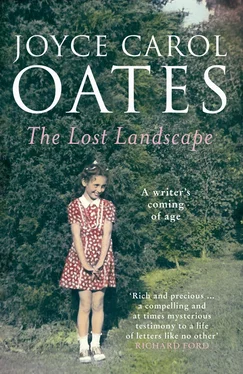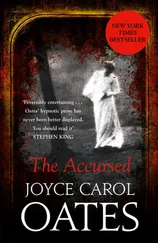“Happy Chicken! I love you. ”
THE LAUGHTER WAS KINDLY, and yet cruel.
Of course you ate chicken when you were a little girl, Joyce! You ate everything we ate.
No. She didn’t think so.
You’d have had to eat whatever was served. Whatever everybody else was eating. You wouldn’t have been allowed to not-eat anything on the table.
No! This was not true.
You hated fatty meat, and you hated things like gizzards, and we laughed at how you tried to hide these—beneath the rim of your plate!—as if, when the plate was removed from the table, the fatty little pieces of meat you’d left would not be discovered. But you certainly ate chicken white meat. Of course you did.
No. That was—that was not true . . .
Children ate what they were given in those days. Children ate, or went hungry. Your father would have spanked the daylights out of you if you’d tried to refuse chicken, or anything that your mother or grandmother prepared.
But no . She did not believe this.
It’s true—she does remember her Hungarian grandmother preparing noodles in the kitchen. Wide swaths of soft-floury ghost-white dough on the circular kitchen table that was covered in oilcloth, and over the oilcloth strips of waxed paper. She recalls the Grandmother, a heavyset woman with gray hair plaited and fastened tight against her head, always in an apron, and the white apron always soiled, wielding a long sharp-glittering knife, rapidly cutting dough into thin strips of noodle. And the Grandmother’s legs encased in thick flesh-colored cotton stockings even in hot weather. The surprise was, sometimes you could see a pleading girl’s face inside the soft flaccid Grandmother-stern face. And the little girl remembers something white-skinned, headless in a large pan simmering on the stove, the surface of the liquid bubbling with dollops of yellowish fat.
You loved your grandmother’s chicken noodle soup! You don’t remember?
She hides her eyes. She hides her face. She is sickened, that terrible smell of wet feathers, plucked-white chicken-flesh.
Protesting, I had nothing to do with that.
Trying to recall in a sudden panic—what had happened to her pet chicken, she’d loved so?
Our memories are what remain on a wall that has been washed down. Old billboards advertising Mail Pouch Tobacco , in shreds. The faintest letters remaining that even as you stare at them, fade. The Hungarian Grandfather who’d been so gruff, so loud, so confident and had so loved his little granddaughter he’d been unable to keep his calloused fingers out of her curls had died at the age of fifty-three, his lungs riddled with steel filings from the foundry in Tonawanda. The Hungarian Grandmother lived for many years afterward and never learned to speak English, still less to read English. The Grandmother died in a nursing home in Lockport to which the granddaughter was never once taken, nor was the granddaughter told the name of the nursing home or its specific location.
Why was this? The Mother had wished to hide the little girl’s eyes. Even when she was no longer a little girl, yet the Mother wished to shield her from upset and worry.
What happened to me? What happened to Happy Chicken?
Oh, the little girl did not know!
The little girl did not know . Just that one terrible day—Happy Chicken was not there.
She mouths the words aloud: “Happy Chicken.”
There is something about the very word happy that is unnerving. Happy happy happy happy.
A terrible word. A terrifying word. Hap-py.
Waking in the night, tangled in bedsheets, shivering in such fright you’d think she was about to misstep and fall into an abyss.
Happy. Hap-py. We were so hap-py . . .
In the cold terror of the night she counts her dead. Like a rosary counting her dead. The Grandfather who died first and after whom the door was opened, that Death might come through to seize them all. The Grandmother who died somewhere far away, though close by. The Mother who died of a stroke when she was in her mid-eighties, overnight. The Father who died over several years, also in his mid-eighties, in the new, twenty-first century shrinking, baffled and yet alert, in yearning wonderment.
Wanted you kids to have the best you could have, but that didn’t happen. We were just too poor. I worked like hell, but it wasn’t enough. Things got better later, but those early years—! The only good thing was, we lived in Millersport. We lived on the old man’s farm. You loved those animals. Remember your pet chicken—Happy Chicken? God, you loved that little red chicken.
Daddy brushing tears from his eyes. Daddy laughing, he wasn’t the kind to be sentimental, Jesus!
She was thinking of how they’d found the rooster—not Mr. Rooster then, but just a limp, slain bird—beautiful feathers smudged and broken—out back of the barn where something, possibly a fox, or a neighbor’s dog, had seized him, shaken him and broken his neck, threw him down and left him for dead. Poor Mr. Rooster!
Seeing the rooster in the dirt, horribly still, the little girl had cried and cried and cried.
And several hens, limp and bloody, eyes open and sightless. Flung down in the dirt like trash.
AND THERE CAME THEtime, not long after this, or maybe it had been this time, when Happy Chicken disappeared.
The girl was stunned and disbelieving and did not cry, at first.
So frightened, the little girl could not cry.
For it seemed terrifying to her, that Happy Chicken might be—somehow— gone.
She’d run screaming to her mother who was upstairs in the farmhouse. The Mother who claimed to have no idea where the little chicken might be. Together they searched in the chicken coop, and in the barn, and out in the fields, and in the pear orchard. Calling Happy Chicken! Happy Chicken! Loudly calling Chick-chick-chick-chick-CHICK!
Other chickens came running, blinking and clucking. Yellow eyes staring.
And not one of these was me.
That morning the Mother had taken the little girl into Lockport to visit with the Other Grandmother, who was her father’s mother, who lived upstairs in a gray clapboard house on Grand Street just across the railroad tracks. The highway that was Transit Road that ran past the little girl’s house became Transit Street inside the Lockport city limits and was but a half-block away from the Other Grandmother’s house.
The Other Grandmother was named Blanche: but she was also called “Grandma”—like the (Hungarian) grandmother. The little girl tried to understand why this would be so. How could the two persons who were so different, be somehow the same —Grandma?
The Other Grandmother, who lived in Lockport, was much nicer than the (Hungarian) Grandmother who lived in Millersport. This Grandmother did not smell of grease, or chicken gizzards, or wet chicken feathers, or any other nasty thing, but rather of something pale and creamy like lilies—did this Grandmother wear perfume? Were this Grandmother’s hands soft from hand lotion? The little girl was always welcome to explore the Grandmother’s rooms which included the Grandmother’s bedroom that had such nice things in it—a shiny pink satin bedspread with white flowers, a “dressing table” with three mirrors and a mirror-top, many sweet-smelling jars and small bottles, a hairbrush with soft bristles that did not hurt the little girl’s hair when the Grandmother brushed it.
Most importantly the Grandmother who was Blanche did not speak angry-sounding guttural words in Hungarian, and would never have raised her voice to scream at anyone; you could not imagine—(the little girl could not imagine!)—this nice Grandmother being cruel to any chicken.
Читать дальше












